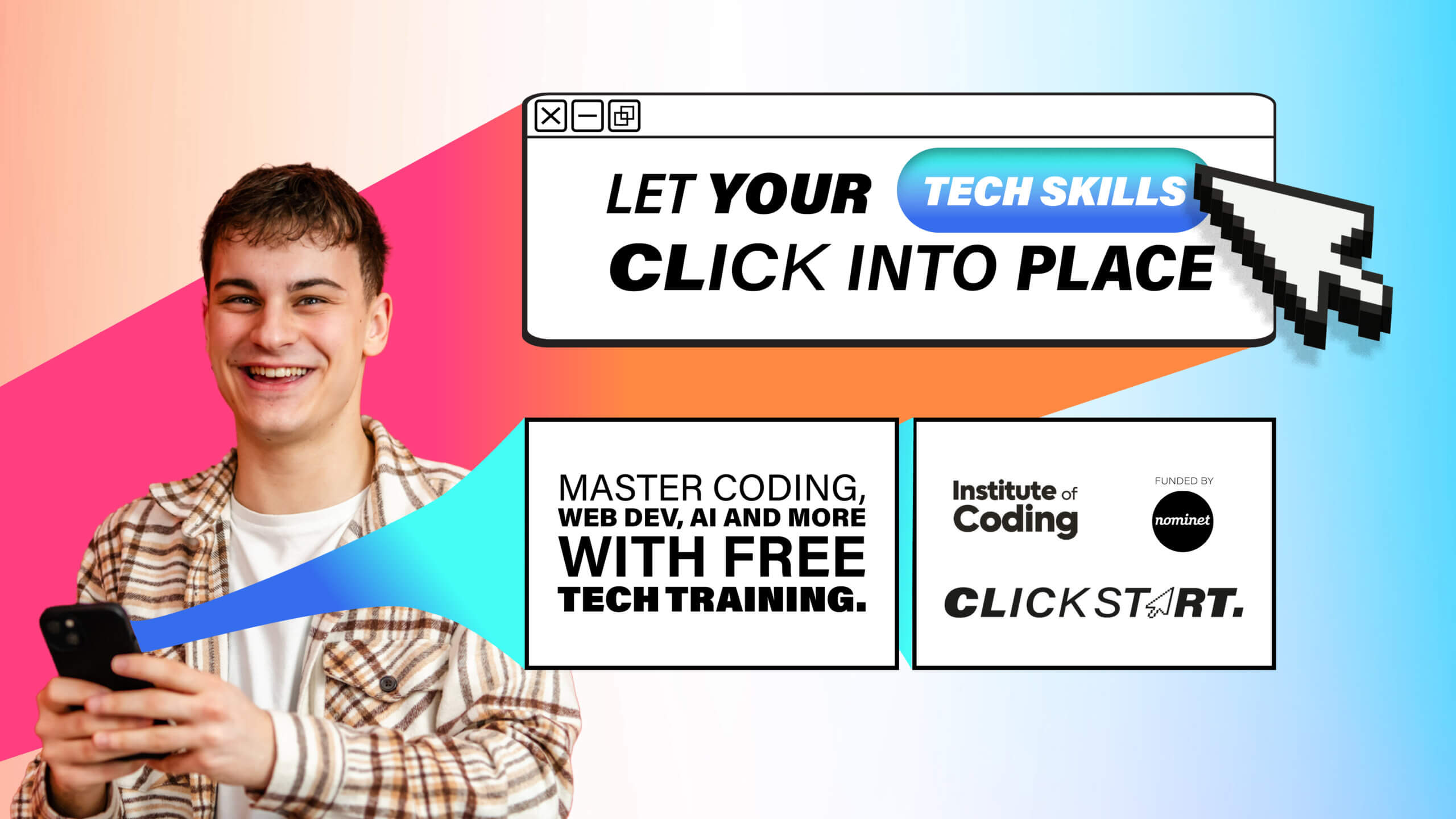The AI era: what it means for your career (and how to prepare)
The printing press, the light bulb, sliced bread; some technological advancements are so powerful, they reshape history. However, none promise to do so as rapidly and drastically as Artificial Intelligence (AI). It’s no longer a futuristic concept, the AI era is here and it’s here to stay, despite its critics.
Blog

To many, AI still feels like something abstract and intimidating…
…especially when headlines talk about AI-powered robots replacing workers. To others, it represents something else entirely: a huge opportunity.
At the Institute of Coding, we believe that understanding and embracing the AI era isn’t just for data scientists or software engineers, it’s for everyone. Whether you work in admin, finance, design, education or retail, AI has probably already impacted your industry more than you know. Learning how it works (and how to work with it) is one of the strongest skills you could develop.
In this article, we’ll look at how AI is changing the job market, and how you can stay ahead of the curve.
What is AI?
Let’s start with the fundamentals: what exactly is Artificial Intelligence? At its core, AI refers to computer systems engineered to perform tasks that typically require human intelligence. This involves giving machines the ability to learn, reason, problem-solve, perceive, and even understand language. Unlike traditional programming where every instruction is explicitly written, AI systems learn from vast amounts of data using sophisticated algorithms and language models to recognise patterns, make predictions and solve problems. IT also adapts its behaviour over time, a process often referred to as machine learning.
Beyond widely discussed generative AI which creates new content like text or images, AI encompasses a broad spectrum of other applications. In the technical world, this includes natural language processing (NLP) for understanding spoken and written language, computer vision for interpreting images and videos, and advanced robotics that allow machines to interact with the physical world. In day-to-day life, you might find AI being used in the personalised recommendations on your favourite streaming service or with the online chatbot that directs you to the right team to help are all AI-powered. It’s about giving machines the ability to reason and learn to help make our lives better.
AI’s impact on the job market
The debate around AI and jobs tends to be in extremes: either it’s going to create a wave of exciting new roles and develop entirely new industries, or it’s going to wipe out entire sectors. The truth is, as usual, more nuanced and hopeful.
Roles enhanced and created by AI
Currently, AI is acting as a powerful assistant across multiple industries, helping humans do their jobs more effectively and even creating entirely new specialisms:
- In healthcare, AI is supporting faster diagnoses, improving treatment plans, and noticing medical anomalies early. This has led to growing demand for “medical AI specialists” who can manage and interpret AI-generated data.
- In finance, fraud detection, smarter investing and client services are all areas that AI is transforming. Roles in data analysis, cybersecurity, and AI compliance are on the rise.
- For marketing, hyper-personalised campaigns, AI-generated insights and recommendations, and automated content tools are changing how marketers work. This is creating demand for marketing specialists who can harness these tools strategically.
- In the manufacturing sector, smart factories use AI to predict maintenance needs, improve production efficiency, and reduce waste, creating roles in robotics and automation management.
- For educators, AI-powered platforms allow for more tailored learning experiences, giving rise to roles in EdTech and AI-informed curriculum design.
Even in traditionally non-technical jobs, AI is becoming part of the workflow. Content creators are using generative AI to brainstorm and outline ideas and project managers are streamlining workflows with automation tools. It’s also a powerful engine for creation. From generating entirely new pieces of art and music to accelerating scientific breakthroughs such drug discovery and testing. The AI era is opening doors to possibilities that simply didn’t exist before.

Jobs undergoing transformation because of AI
At the same time, AI is reshaping or replacing tasks that are routine, repetitive, or predictable. Examples include:
- Data entry: AI can now process large volumes of structured data without human input, though careful anonymisation and preparation of data remains a critical human task.
- Basic admin work: scheduling, email filtering, and form completion can be handled by automation.
- Customer service: AI-powered chatbots are handling first-line queries, reducing the need for large call centres. Digital assistants are nothing new, but they are becoming so much better than they used to be.
- Manual factory tasks: in some industries, robotics are taking over repetitive assembly-line work.
But this isn’t necessarily about job losses, it’s about job evolution. Many of these roles are becoming more strategic and people-focused. The question isn’t “will my job exist in five years?”, but “how will my job change, and how can I be ready for that?”
How can I prepare for the AI era?
To thrive in the AI era, you don’t need to become a machine learning engineer, but being digitally savvy will be essential. Here’s how to start building skills for the future:
- Embrace AI literacy
AI literacy means understanding what AI is (and isn’t), how it works, and what it can do for you. You don’t have to create your own large language models, but you should know how to use AI tools like generative AI effectively and responsibly, whether it’s at work or in your personal life.
- Build core digital skills
Digital literacy, data interpretation, spreadsheet confidence, and online research are now essential in most careers. These are transferable, evergreen skills that boost your employability across sectors. Read the essential digital skills framework for a deeper understanding of what skills you may need to improve.
- Learn to code (even a little)
Learning a beginner-friendly language like Python or JavaScript can give you an edge, even if you’re not planning a technical career. It helps you better understand how AI tools are built and interact with them more effectively.
- Explore AI specialisms
For those who want to go deeper, AI is opening doors in fields like:
- Data science
- Machine learning
- AI ethics
- Prompt engineering (crafting effective instructions for AI tools)
These roles are in high demand and expected to grow significantly in the coming years.
- Prompt Engineering
Learn the art of crafting effective inputs (prompts) to get the best and most accurate results from AI tools. This includes understanding how to guide AI for specific tasks, mitigate biases, and ensure safe and ethical outputs. We’re big fans of the ‘GCSE Framework’: give a specific Goal, provide plenty of Context, give a Specific example, and manage your Expectations. This is a great place to start if you want to get better results when speaking to AI.
- Learn to recognise AI content
We’ve probably all been fooled by a harmless image or video, not realised it was AI-generated. However, as AI gets better at creating realistic looking content, we must get better at recognising it. Deep fakes and AI-scam call centres are genuine threats, but you can stay safer if you learn to recognise the signs.

Busting the myths: common misconceptions about the AI era
Let’s clear up a few things that often cause confusion:
“AI will take all our jobs.”
Unlikely. AI is transforming roles, not erasing them. Most future jobs will involve working alongside AI, not being replaced by it.
“You need to be a coding genius.”
Not true. Many people working successfully with AI don’t come from tech backgrounds. Critical thinking, creativity, and an intellectual curiosity matter just as much as coding.
“AI is unbiased and never wrong.”
AI systems are only as good as the data they’re trained on, and that data often contains historical biases. That’s why ethical AI development requires human oversight, diverse teams, and critical thinking. AI is often wrong, so always double check what it’s telling you.
The environmental and ethical questions of AI
As AI use expands, so do the challenges. Running AI models at scale requires huge amounts of energy, often from non-renewable sources. To give you an idea, a single query to a popular generative AI tool can consume significantly more electricity than a standard web search. This immense demand is fuelling the rapid expansion of data centres, creating substantial hardware waste and increasing pressure on our planet’s resources, including vast amounts of water needed for cooling.
On the ethical front, we need to keep asking critical questions:
- Accountability: who is responsible when an AI makes a harmful decision: the developer, the user, or the company? Establishing clear lines of accountability is crucial as AI takes on more complex tasks.
- Misinformation and manipulation: how do we prevent the misuse of AI for creating convincing deepfakes or spreading misinformation? Developing stronger digital literacy and pushing for transparency in AI-generated content, such as unremovable watermarks on AI-generated visuals.
- Privacy and data use: what personal data is being collected, and how is it truly being used by AI systems? As AI thrives on vast datasets, ensuring privacy and informed consent is more important than ever.
AI isn’t just a technical topic, it’s a human one. Everyone has a role to play, which is why we feel it’s so important to learn about AI and engage in debates to help shape its future responsibly.
Your AI journey starts here
At the Institute of Coding, we’re committed to making tech education inclusive and impactful. If you’re looking to understand AI tools or simply future-proof your career, we’re here to help.
Recommended short digital skills courses:
An Introduction to Generative Artificial Intelligence – Click Start with The Open University
This free course helps you understand how AI creates text, images, and media, and how to use these tools safely, ethically, and creatively. It’s designed for beginners, so no experience is required.
Click Start by The University of Leeds – How to Get Into AI course on FutureLearn
This comprehensive program guides you through the foundational concepts and practical applications of AI, including its history, ethical considerations, and how it’s used across various industries from healthcare to finance. You’ll gain essential skills in data analysis and problem-solving, preparing you for a dynamic career in AI.

Ready to future-proof your career for the AI era?
Explore our free courses and start your AI journey with the Institute of Coding today.




